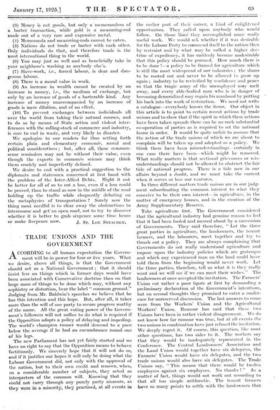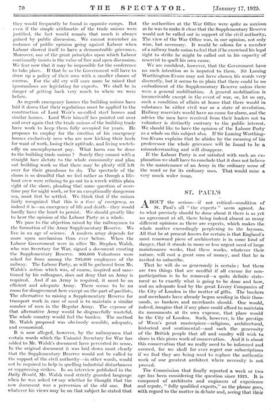• TRADE UNIONS AND THE GOVERNMENT
ACCORDING to all human expectation the Govern- ment will be in power for four or five years. What we desire, above all things, is that the Government should act. as a National Government ; that it should o insist less on things which in former days would have been associated with Conservative doctrine than on that large mass of things to be done which may, without any sophistry or distortion, bear the label " common ground." Judging from Mr. Baldwin's speeches we believe that he has this intention and this hope. But, after all, it takes more than the will of one party to secure progress worthy of the name. All the great voting power of the Govern- ment's followers will not suffice to do what is required if the Opposition adopts a policy of delaying and impeding. The world's champion runner would descend to a pace below the average if he had an encumbrance round one of his legs. The new Parliament has not yet fairly started and we have no right to say that the Opposition means to behave factitiously. We sincerely hope that it will not do so, and if it justifies our hopes it will only be doing what the Labour Government did, not only with the approval of the nation, but to their own credit and renown,'when, on a considerable number of subjects, they acted as interpreters of the common will. Knowing that they could not barrY through any purely party measure, as they were in a minority; they practised, at -all events in the earlier part of their career, a kind of enlightened opportunism. They Failed upon anybody who would follow. On those lines% they accomplished some really useful work. We would ask whether if it was desirable for the Labour Party to ccanmend itself to the nation then by restraint and by what may be called a higher doc- trine of expediency, it has suddenly become undesirable that this policy should be pursued. How much there is to be done !-a policy to be framed for agriculture which is still the most widespread of our industries ; the slums to be rooted out and never to he allowed to grow up again ; industry to be revivified by confidence and peace so that the tragic army of the unemployed may melt away, and every able-bodied man who is in danger of becoming demoralized may regain his manhood by putting his back into the work of restoration. We need not write a catalogue—everybody knows the items. Our object in this article is to point to certain recent actions by trade unions and to show that if the spirit in which these actions have been taken spreads there can be no such substantial co-operation of parties as is required to set the national house in order. It would be quite unfair to assume that the action of the trade unions of which we are about to complain will be taken up and adopted as a policy. We think there have been misunderstandings---certainly in one case there have been—which might be removed. What really matters is that sectional grievances or mis- understandings should not be allowed to obstruct the fair tide of national progress. There is a tide now in our affairs beyond a doubt, and we must take the current when it serves or lose our ventures.
In three different matters trade unions arc in our judg- ment subordinating the common interest to what they conceive to be their own interest—in agriculture, in the matter of emergency houses, and in the creation of the Army Supplementary Reserve.
Take agriculture first. The Government considered that the agricultural industry had genuine reason to feel that it had been fooled and messed about by a succession of Governments. They said therefore, " Let the three great parties in agriculture, the landowners, the tenant farmers, and the labourers, meet together and try to thrash out a policy. They are always complaining that Governments do not really understand agriculture and impose upon the industry policies which are grotesque and which any experienced man on the land could have told them from the beginning would never work. Let the three parties, therefore, tell us what it is they really want and we will see if we can meet their wishes." The landowners at once accepted the invitation. The Farmers' Union cut rather a poor figure at first by demanding a preliminary declaration of the Government's intentions, but on second thoughts they promised to enter a confer- ence for unreserved discussion. The last answers to come were from the Workers' Union and the Agricultural Workers' Union. Rumour has said that these two Unions have been in rather violent disagreement. We do not know how far rumour was true, but at all events the two unions iri combination have just refused the invitation. We deeply regret it. Of course, this question, like most other questions, has two sides to it. The workers say that they would be inadequately represented in the Conference. The Central Landowners' Association and the Land Union would together have six delegates, the Farmers' Union would have six delegates, and the two trade unions would also have six delegates. The Trade Unions say, " This means that there would be twelve employers against six employees. -No thanks ! " As a matter of fact, things would not work out according to that all too simple arithmetic. The tenant' farmers have so many points to settle with the landowners that they would frequently be found in opposite camps. But even if the simple arithmetic of the trade unions were justified, the fact would remain that much is always gained by public discussion. We cannot remember an instance of public opinion going against Labour when Labour showed itself to have a demonstrable grievance.
Moreover, one of the great principles upon which Labour continually insists is the value of free and open discussion.
We fear now that it may be impossible for the conference to take place. If that be so the Government will have to draw up a policy of their own with a smaller chance of success. For the old cry will once more be raised that ignoramtses are legislating for experts. We shall be in danger of getting back very much to where we were before.
As regards emergency houses the building unions have laid it down that their regulations must be applied to the construction of Lord Weir's so-called steel houses and similar houses. Lord Weir himself has pointed out over and over again that the trade unions of the building trade have work to keep them fully occupied for years. He proposes to employ for the erection of his emergency houses exclusively men who are now kicking their heels for want of work, losing their aptitude, and living wretch- edly on unemployment pay. What harm can be done to the building trade unions ? Surely they cannot with a straight face dictate to the whole community and plan out building work so that there may be plenty still left over for their grandsons to do. The spectacle of the slums is so dreadful that we feel rather as though a life- boat crew were refusing to go out to a wreck within plain sight of the shore, pleading that some question of over- , time pay for night work, or for an exceptionally dangerous sea, must first be settled. We think that if the unions fairly recognized that this is a time of emergency, as indeed it is—an emergency of life and death—they would hardly have the heart to persist. We should greatly like to hear the opinion of the Labour Party as a whole.
We pass to the objection raised by the railwaymen to the formation of the Army Supplementary Reserve. We live in an age of science. A modern army depends far more upon mechanism than ever before. When the Labour Government were in office Mr. Stephen Walsh, who was Secretary for War, signed a document creating the Supplementary Reserve. 300,000 Volunteers were asked for from among the 700,000 employees of the railway. The Labour Party, as will be gathered from Mr. Walsh's action which was, of course, inspired and sanc- tioned by his colleagues, does not deny that an Army is required. And if an Army is required, it must be an efficient and adequate Army. There seems to be no room for disagreement here except on the part of pacifists. The alternative to raising a Supplementary Reserve for transport work in ease of need is to maintain a similar number of men in the Regular Army. The expense of that alternative Army would be disgracefully wasteful. The whole country would feel the burden. The method Mr. Walsh proposed was obviously sensible, adequate, and economical.
It is now alleged, however, by the railwaymen that certain words which the Unionist Secretary for War has added to Mr. Walsh's document have perverted its sense. In the original document it was laid down mast clearly that the Supplementary Reserve would not be called to the support of the civil authority—in other words, would not be required to help in quelling industrial disturbances or suppressing strikes. In an interview published in the Daily Herald, Mr. Walsh used strictly guarded language when he was asked tef say whether he thought that the new document was a perversion of the old one. But whatever his views- may be on that subject -he stated that the authorities at the War Office were quite as anxious as he was to make it clear that the Supplementary Reserve would not be called out in support of the civil authority: The view of the War Office was, in our opinion, not only wise, but necessary. It would be odious for a member of a railway trade union to feel that if he exercised his legal right to strike he might be called out in his capacity of reservist to quell his own cause.
We are confident, however, that the Government have- rio such intention as is imputed to them. Sir Laming Worthington-Evans may not have chosen his words very' discreetly, but it seems to us plain that there could be no embodiment of the Supplementary Reserve unless there were a general mobilization. A general mobilization is inconceivable except in the event of war, or, let us say,. such a condition of affairs at home that there would in substance be either civil war or a state of revolution. Railway reservists would have no cause for alarm, and the advice the men have received from their leaders not to volunteer is distinctly contrary to the public interest. We should like to have the opinion of the Labour Party as a whole on this subject also. If Sir Laming Worthing- ton-Evans explains that he abides by the meaning of his predecessor the whole grievance will be found to be a misunderstanding and will disappear.
If the Labour Party is not satisfied with such an ex- planation we shall have to conclude that it does not believe, in the maintenance of an Army in the ordinary sense of the word or for its ordinary uses. That would raise a very much wider issue.











































 Previous page
Previous page